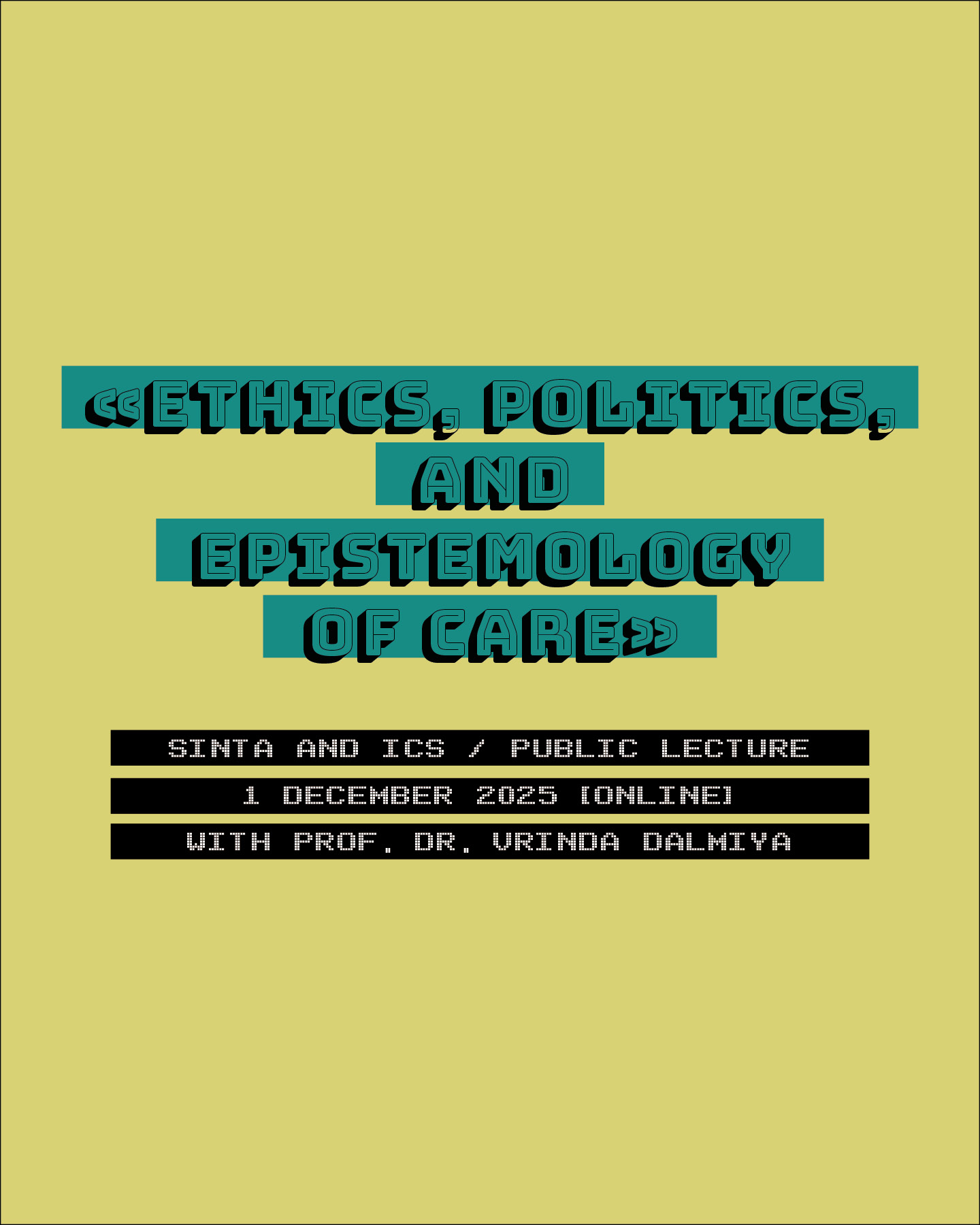News
Public Event | Kunsthaus Biel Centre d’art Bienne (KBCB)
«Public Event»
Public Program & Workbook Launch
Saturday 29 November 2025; 14:00 – 19:30
Kunsthaus Biel Centre d’art Bienne (KBCB)
Public Workshop (EN/DE/FR)
14:00 – 16:00
“Plankton Studio: Observing the Unseen”
With Riikka Tauriainen & Marta Musso
This transdisciplinary workshop invites participants to explore plankton through artistic and scientific lenses. Led by visual artist Riikka Tauriainen and marine biologist Marta Musso, the workshop offers hands-on activities and reflections on microbial aquatic life, ocean literacy, and ecological entanglement. Families and anyone interested in plankton and art–science dialogue are warmly welcome.
Registration: until 24 November via this LINK
Where: Library, 1st floor
Costs: Free of charge
Access:Recommended for families with children aged 6 and over. Held in spoken English with optional translation to basic German. Wheelchair-accessible space with adjustable lighting. During the workshop, we will engage in visual activities using microscopes and drawing materials, and reflect on ecological issues. We hope to facilitate interactive exchange formats. Most of the work will be done at tables.
Public program with Study Group on Relational Ecologies (EN)
16:00 – 17:30 (Foyer)
“Taste library- eat the city!”
With Seraina Grupp
This edible installation invites you to map the city through taste. Artist Seraina Grupp shares the story of her hometown, from her childhood garden to today’s pavement gaps. Collectively, we will explore recipes, memories, and tastes of Biel, guided by research into stories and taste profiles that silently disappear in a mega-industrial food system.
17:30 – 19:30 (Screening at Filmpodium Biel/Bienne)
please note that the space is not accessible with wheelchairs
“On Extraction, Relations and Care:
Knowledge Production in Artistic–Scientific Processes”
With Andrea Bordoli, Celestina Widmer, Jinat Hossain, Marta Musso, Nicolle Bussien and Riikka Tauriainen
This afternoon, the Study Group on Relational Ecologies will present a screening of four short films, followed by a collective discussion. The programme will reflect on how different approaches to knowledge production influence artistic-scientific work and explore practices of care, collaboration and shared methodologies.
The Study Group emerged from an interest in relational ecologies and the need for sustained, intimate formats of exchange, offering a space where research is shaped through mutual learning and imagination. The group brings together researchers and practitioners focusing on visual anthropology, feminist political ecology, ecofeminist activism, marine science and art.
A workbook developed within a collaborative project on 'Plankton Ecosystems' will also be launched at the event. This documents artistic-scientific processes and invites further engagement.
«Public Event»
Public Program & Workbook Launch
Saturday 29 November 2025; 14:00 – 19:30
Kunsthaus Biel Centre d’art Bienne (KBCB)
Public Workshop (EN/DE/FR)
14:00 – 16:00
“Plankton Studio: Observing the Unseen”
With Riikka Tauriainen & Marta Musso
This transdisciplinary workshop invites participants to explore plankton through artistic and scientific lenses. Led by visual artist Riikka Tauriainen and marine biologist Marta Musso, the workshop offers hands-on activities and reflections on microbial aquatic life, ocean literacy, and ecological entanglement. Families and anyone interested in plankton and art–science dialogue are warmly welcome.
Registration: until 24 November via this LINK
Where: Library, 1st floor
Costs: Free of charge
Access:Recommended for families with children aged 6 and over. Held in spoken English with optional translation to basic German. Wheelchair-accessible space with adjustable lighting. During the workshop, we will engage in visual activities using microscopes and drawing materials, and reflect on ecological issues. We hope to facilitate interactive exchange formats. Most of the work will be done at tables.
Public program with Study Group on Relational Ecologies (EN)
16:00 – 17:30 (Foyer)
“Taste library- eat the city!”
With Seraina Grupp
This edible installation invites you to map the city through taste. Artist Seraina Grupp shares the story of her hometown, from her childhood garden to today’s pavement gaps. Collectively, we will explore recipes, memories, and tastes of Biel, guided by research into stories and taste profiles that silently disappear in a mega-industrial food system.
17:30 – 19:30 (Screening at Filmpodium Biel/Bienne)
please note that the space is not accessible with wheelchairs
“On Extraction, Relations and Care:
Knowledge Production in Artistic–Scientific Processes”
With Andrea Bordoli, Celestina Widmer, Jinat Hossain, Marta Musso, Nicolle Bussien and Riikka Tauriainen
This afternoon, the Study Group on Relational Ecologies will present a screening of four short films, followed by a collective discussion. The programme will reflect on how different approaches to knowledge production influence artistic-scientific work and explore practices of care, collaboration and shared methodologies.
The Study Group emerged from an interest in relational ecologies and the need for sustained, intimate formats of exchange, offering a space where research is shaped through mutual learning and imagination. The group brings together researchers and practitioners focusing on visual anthropology, feminist political ecology, ecofeminist activism, marine science and art.
A workbook developed within a collaborative project on 'Plankton Ecosystems' will also be launched at the event. This documents artistic-scientific processes and invites further engagement.



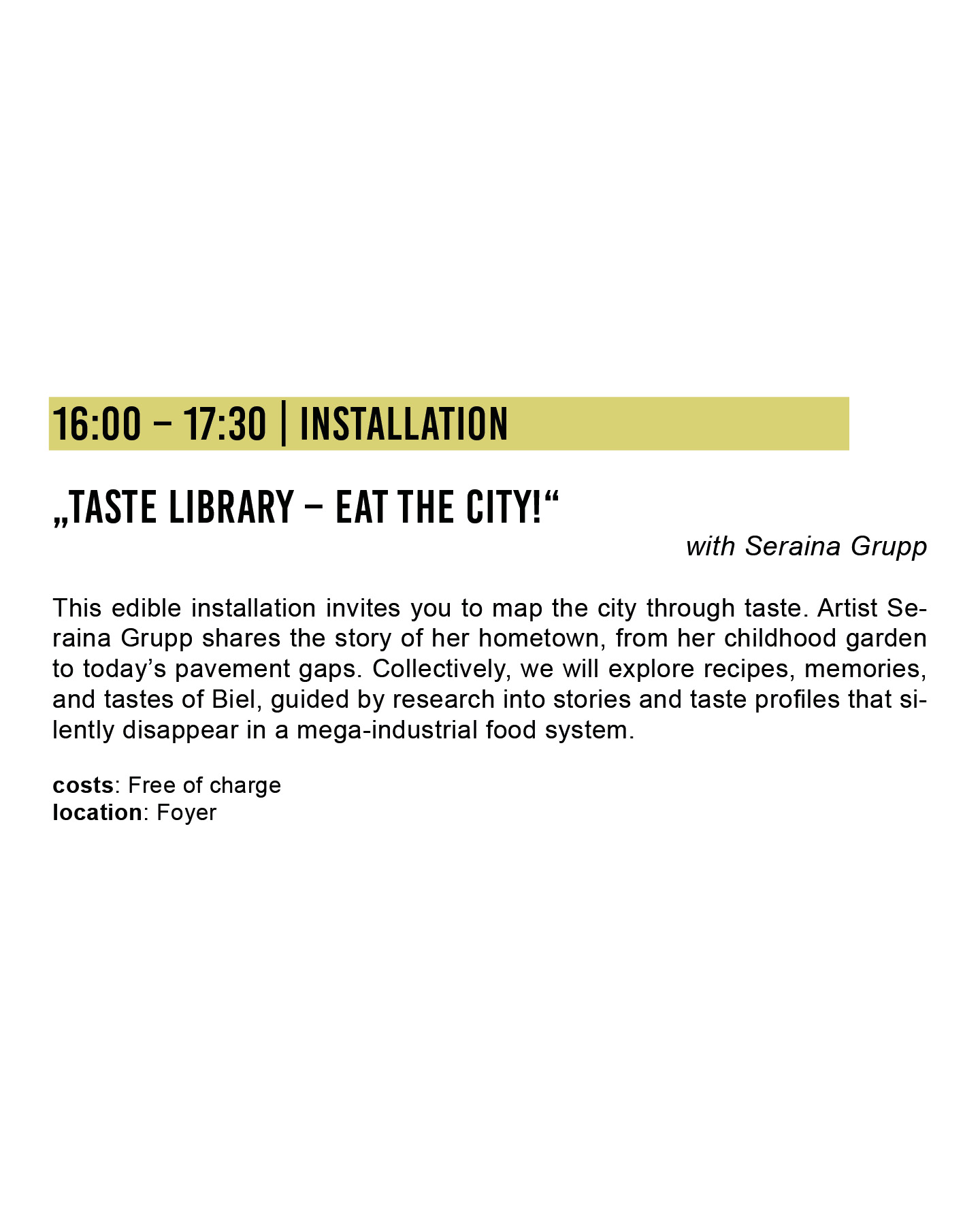
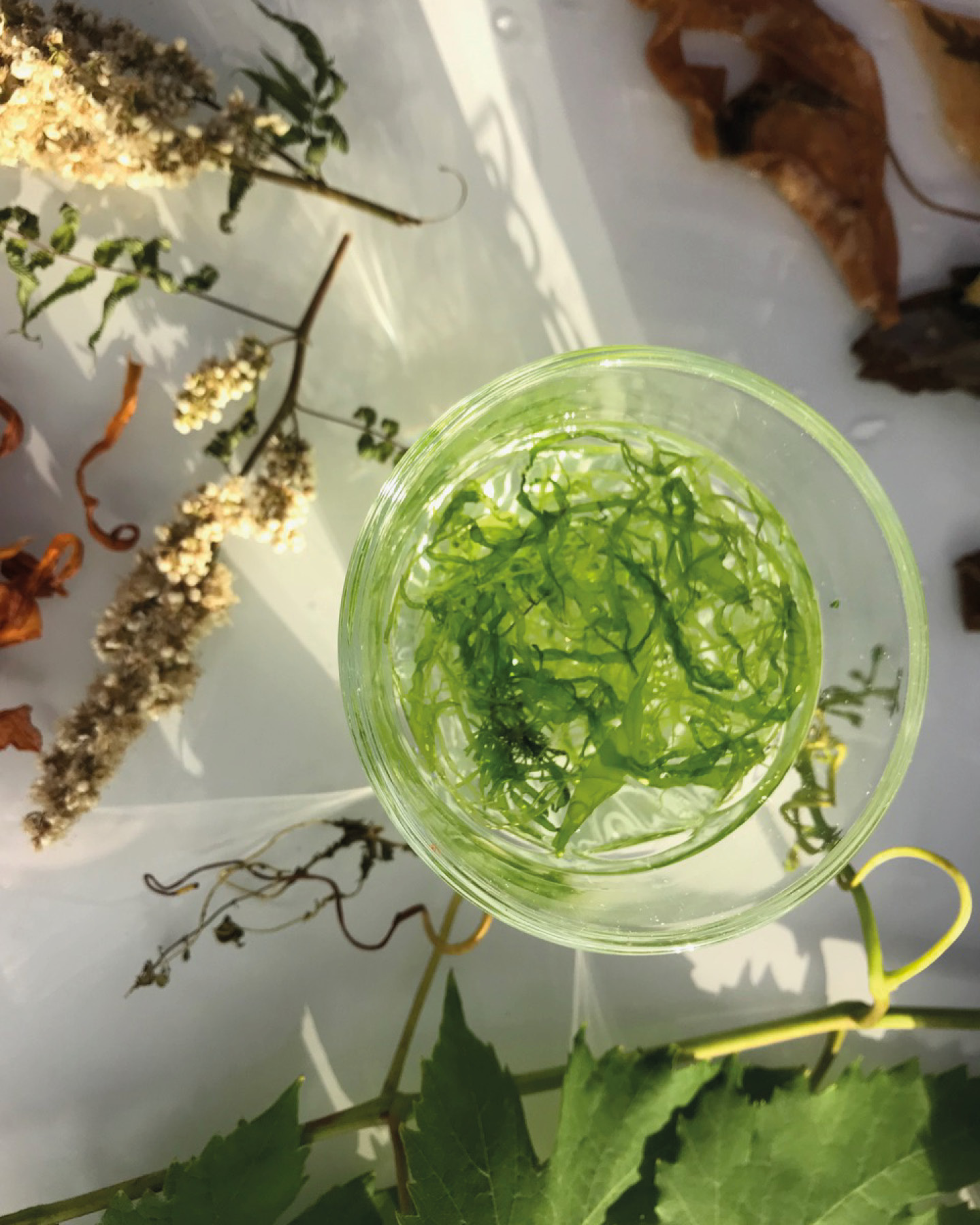



Exhibition, Vernissage, Public Event | Kunsthaus Biel Centre d’art Bienne (KBCB)
«Waterscape Imaginaries»
Vernissage: TH 16 October, 5.30 pm
Exhibition: 17.10. – 7.12.2025
Kunsthaus Biel Centre d’art Bienne (KBCB)
Public Program & Workbook Launch: Saturday 29 November 2025
The exhibition „Waterscape Imaginaries“ explores microbial aquatic life through the lens of an art–science collaboration between visual artist Riikka Tauriainen and marine biologist Marta Musso. In dialogue with the Plankton Ecosystems project and selected works from the Glicksman Collection of environmental art from the 1970s, the exhibition traces connections between past and present visions of ecological art.
The show brings together videos, soundscapes, drawings and mappings, collected from field trips between the Alps, the rivers and the Sea, alongside blueprints of the historical artworks such as the Survival Pieces and Portable Fish Farm. These resonances invite reflection on the shifting imaginaries of water, relationality, and ecological entanglement.
The exhibition is organised by EcoArtLab, HKB (BFH), in collaboration with Kunsthaus Biel Centre d’art Bienne (KBCB), ETH Zurich, European Research Institute and Kunstmuseum St.Gallen. With the support of Studies in the Arts (SINTA) and Pro Helvetia Synergies.
«Waterscape Imaginaries»
Vernissage: TH 16 October, 5.30 pm
Exhibition: 17.10. – 7.12.2025
Kunsthaus Biel Centre d’art Bienne (KBCB)
Public Program & Workbook Launch: Saturday 29 November 2025
The exhibition „Waterscape Imaginaries“ explores microbial aquatic life through the lens of an art–science collaboration between visual artist Riikka Tauriainen and marine biologist Marta Musso. In dialogue with the Plankton Ecosystems project and selected works from the Glicksman Collection of environmental art from the 1970s, the exhibition traces connections between past and present visions of ecological art.
The show brings together videos, soundscapes, drawings and mappings, collected from field trips between the Alps, the rivers and the Sea, alongside blueprints of the historical artworks such as the Survival Pieces and Portable Fish Farm. These resonances invite reflection on the shifting imaginaries of water, relationality, and ecological entanglement.
The exhibition is organised by EcoArtLab, HKB (BFH), in collaboration with Kunsthaus Biel Centre d’art Bienne (KBCB), ETH Zurich, European Research Institute and Kunstmuseum St.Gallen. With the support of Studies in the Arts (SINTA) and Pro Helvetia Synergies.
Public Event | Swiss Post‘s art collection
«Let’s talk about: Kunst & Klimakriese»
Thursday, 4 December 2025, 18:00
Zurich 1 Sihlpost Post Office
Kasernenstrasse 97, 8004 Zurich
Registration: Link
The event is part of the public discussion series ‘Let‘s talk about’ and accompanies the recently published book on the Swiss Post‘s art collection. The discussions offer insights into the artists‘ works and invite dialogue about art, society and the present day.
ANDRIU DEPLAZES in conversation with Yvonne Schmidt, Professor at the Institute for Practices and Theories of the Arts at HKB, Director of EcoArtLab, Bern
What role can art play in times of ecological crisis? The discussion will focus on questions of responsibility, empathy and the ability of artistic works to open up new perspectives on how we treat nature and the climate. It will also examine the connections between the body, landscape and social vulnerability.
Moderator: Isabel Zürcher, freelance art historian, BaselThe discussion will be held in German.
«Let’s talk about: Kunst & Klimakriese»
Thursday, 4 December 2025, 18:00
Zurich 1 Sihlpost Post Office
Kasernenstrasse 97, 8004 Zurich
Registration: Link
The event is part of the public discussion series ‘Let‘s talk about’ and accompanies the recently published book on the Swiss Post‘s art collection. The discussions offer insights into the artists‘ works and invite dialogue about art, society and the present day.
ANDRIU DEPLAZES in conversation with Yvonne Schmidt, Professor at the Institute for Practices and Theories of the Arts at HKB, Director of EcoArtLab, Bern
What role can art play in times of ecological crisis? The discussion will focus on questions of responsibility, empathy and the ability of artistic works to open up new perspectives on how we treat nature and the climate. It will also examine the connections between the body, landscape and social vulnerability.
Moderator: Isabel Zürcher, freelance art historian, BaselThe discussion will be held in German.
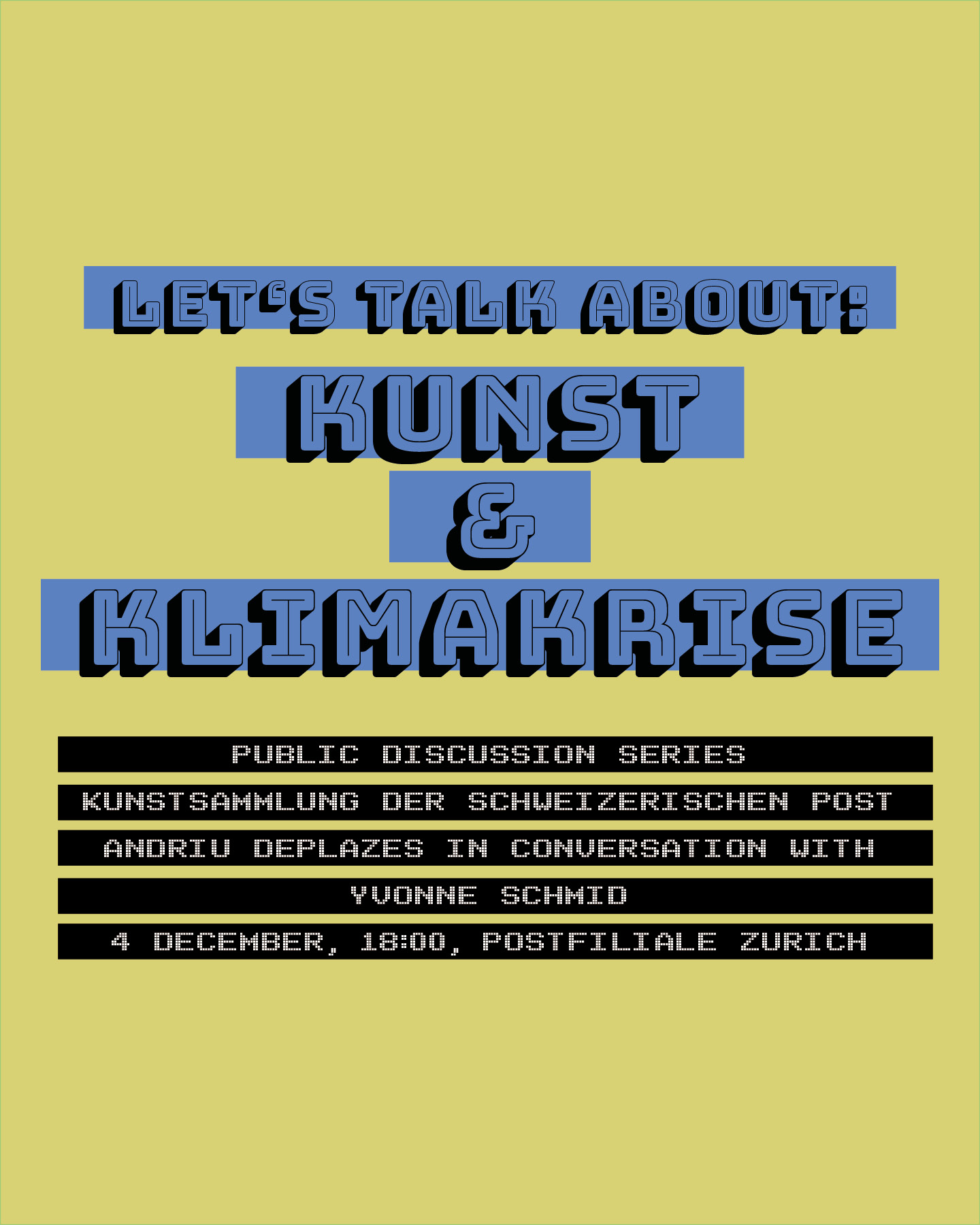
Conference,
Speculative Geographies between Art and Science
| Neue Kulturgeografie | Augsburg DE
« Speculative Geographies between Art and Science – Insights into the mLAB»
During an evening salon at the NKG – Neue Kulturgeografie Conference in Augsburg, Germany on ‘Speculative Geographies between Art and Science – Insights into the mLAB’, a dialogue-based setting was created with contributions from EcoArtLab PhD researcher Johanna Paschen and other mLAB contributors, led by artist and mLAB coordinator Mirko Winkel.
An mLAB workshop was following the salon dialogue. During the workshop, questions surrounded: How to collaborate just? Who shapes the future? Then bags were created with the motto: Fragen zum Tragen!
The mLAB is an experimental laboratory at the University of Bern, cooperating with the EcoArtLab, that encourages researchers and students to explore new forms of transdisciplinary collaboration. The aim is to make new media, digital technologies and artistic working methods an integral part of knowledge generation and to reflect critically on them.
Photos: Rosa Philipp
« Speculative Geographies between Art and Science – Insights into the mLAB»
During an evening salon at the NKG – Neue Kulturgeografie Conference in Augsburg, Germany on ‘Speculative Geographies between Art and Science – Insights into the mLAB’, a dialogue-based setting was created with contributions from EcoArtLab PhD researcher Johanna Paschen and other mLAB contributors, led by artist and mLAB coordinator Mirko Winkel.
An mLAB workshop was following the salon dialogue. During the workshop, questions surrounded: How to collaborate just? Who shapes the future? Then bags were created with the motto: Fragen zum Tragen!
The mLAB is an experimental laboratory at the University of Bern, cooperating with the EcoArtLab, that encourages researchers and students to explore new forms of transdisciplinary collaboration. The aim is to make new media, digital technologies and artistic working methods an integral part of knowledge generation and to reflect critically on them.
Photos: Rosa Philipp
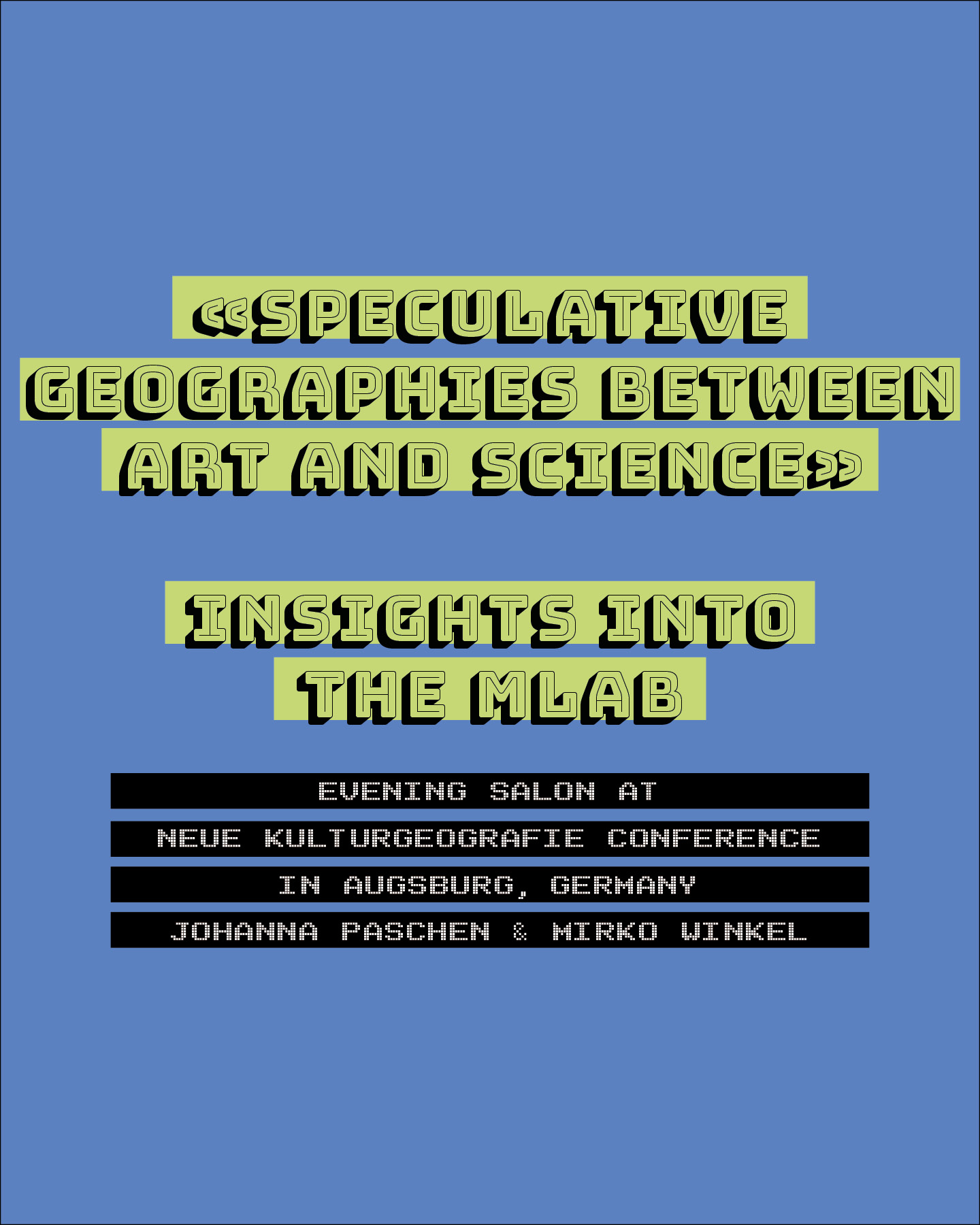
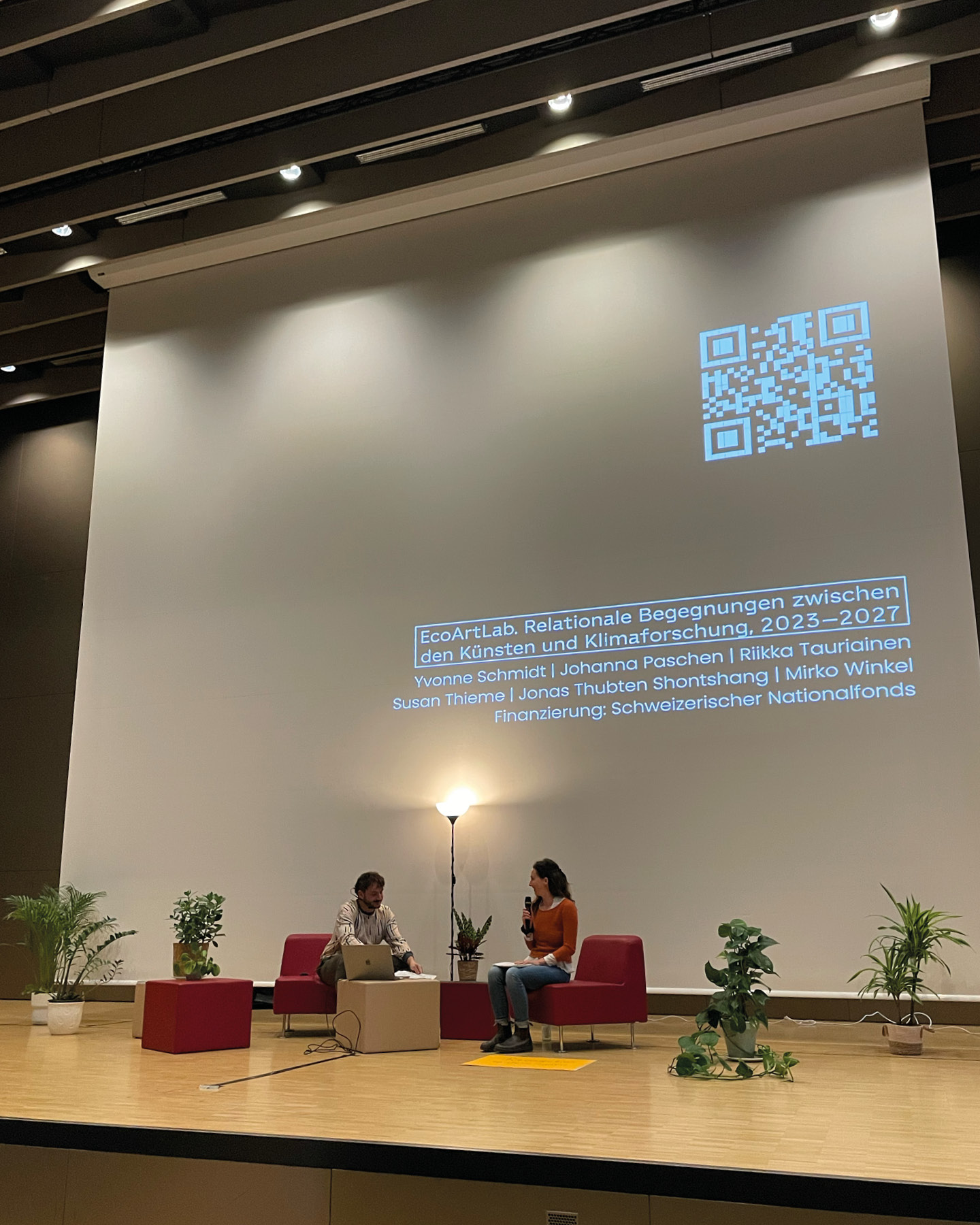
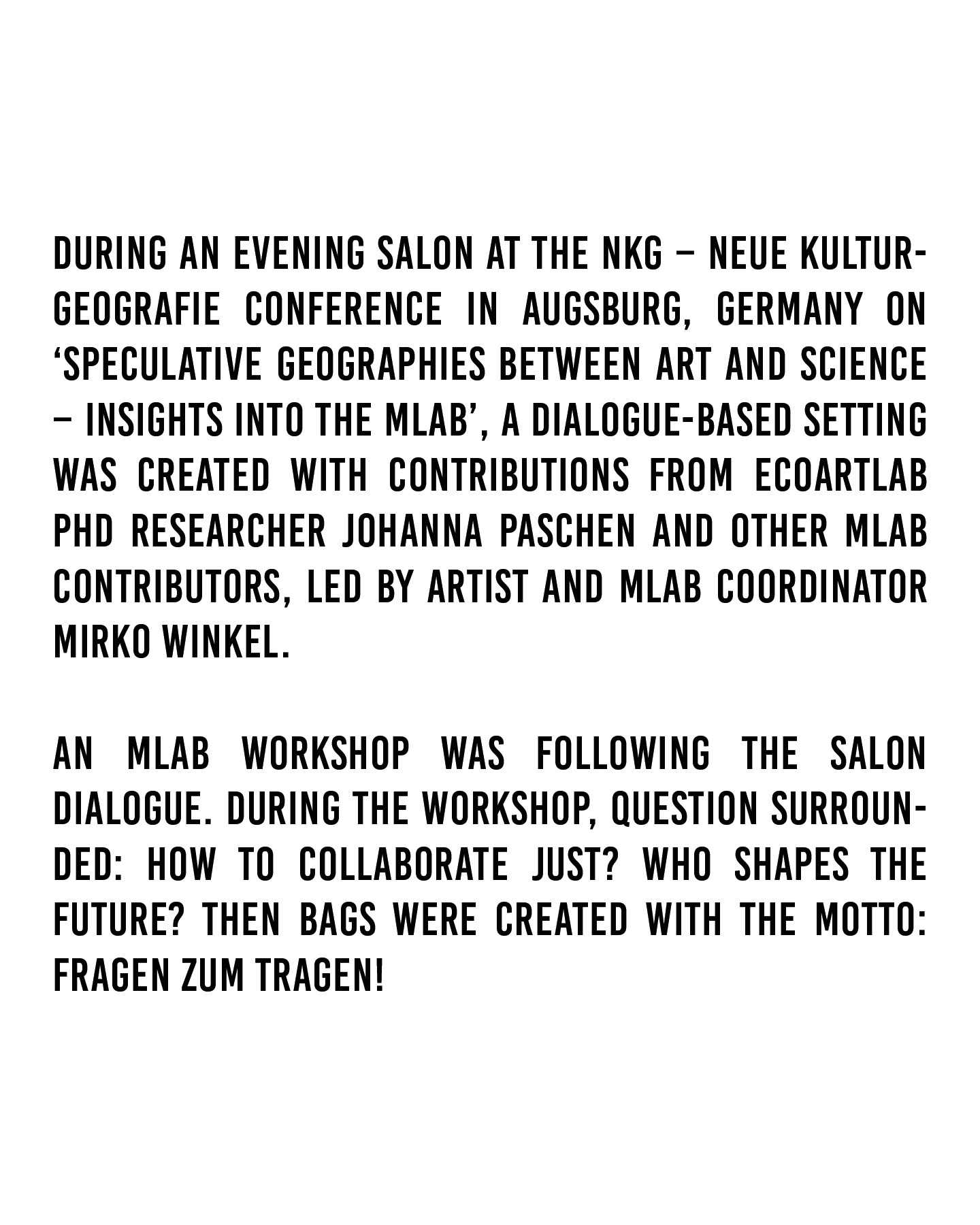
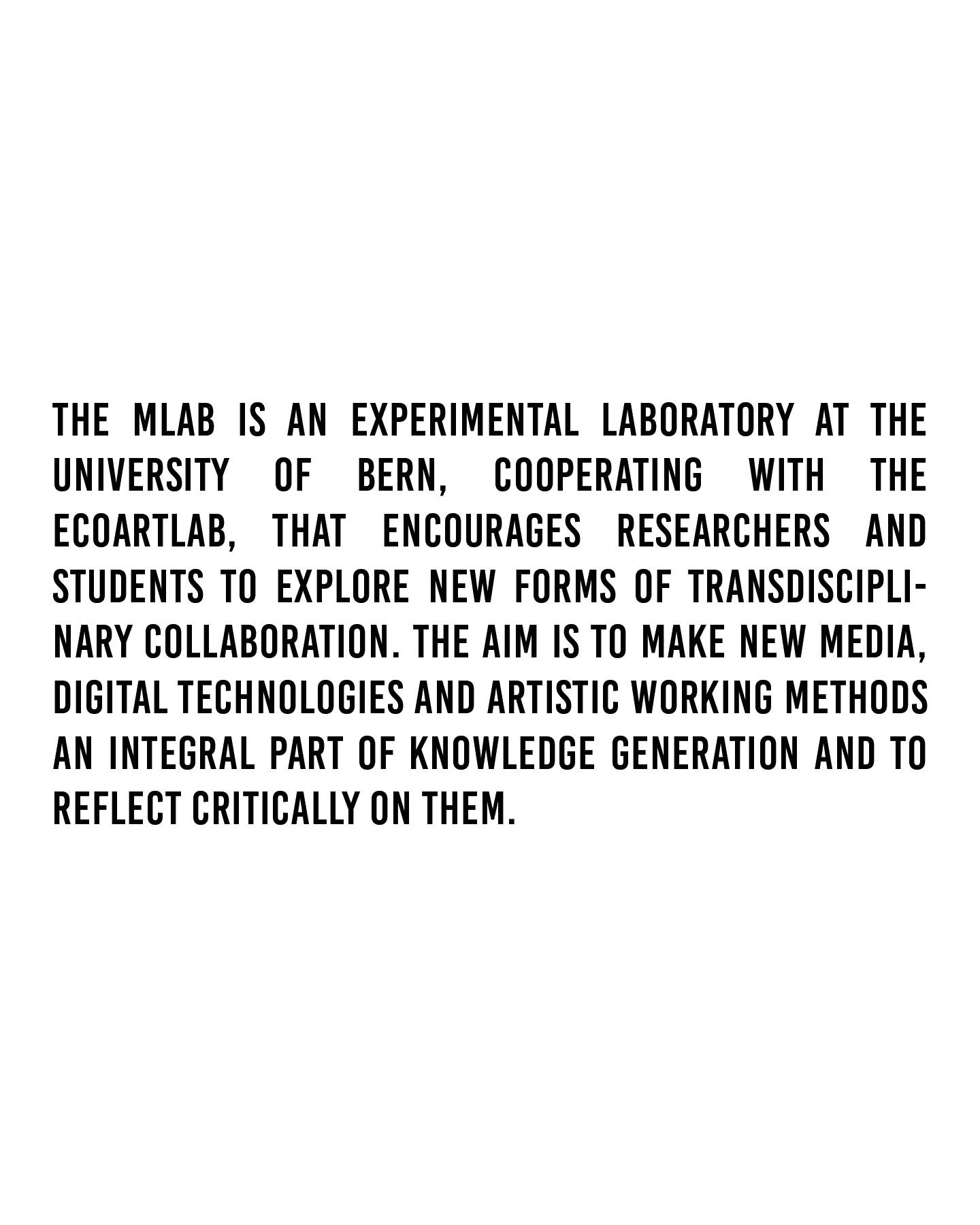
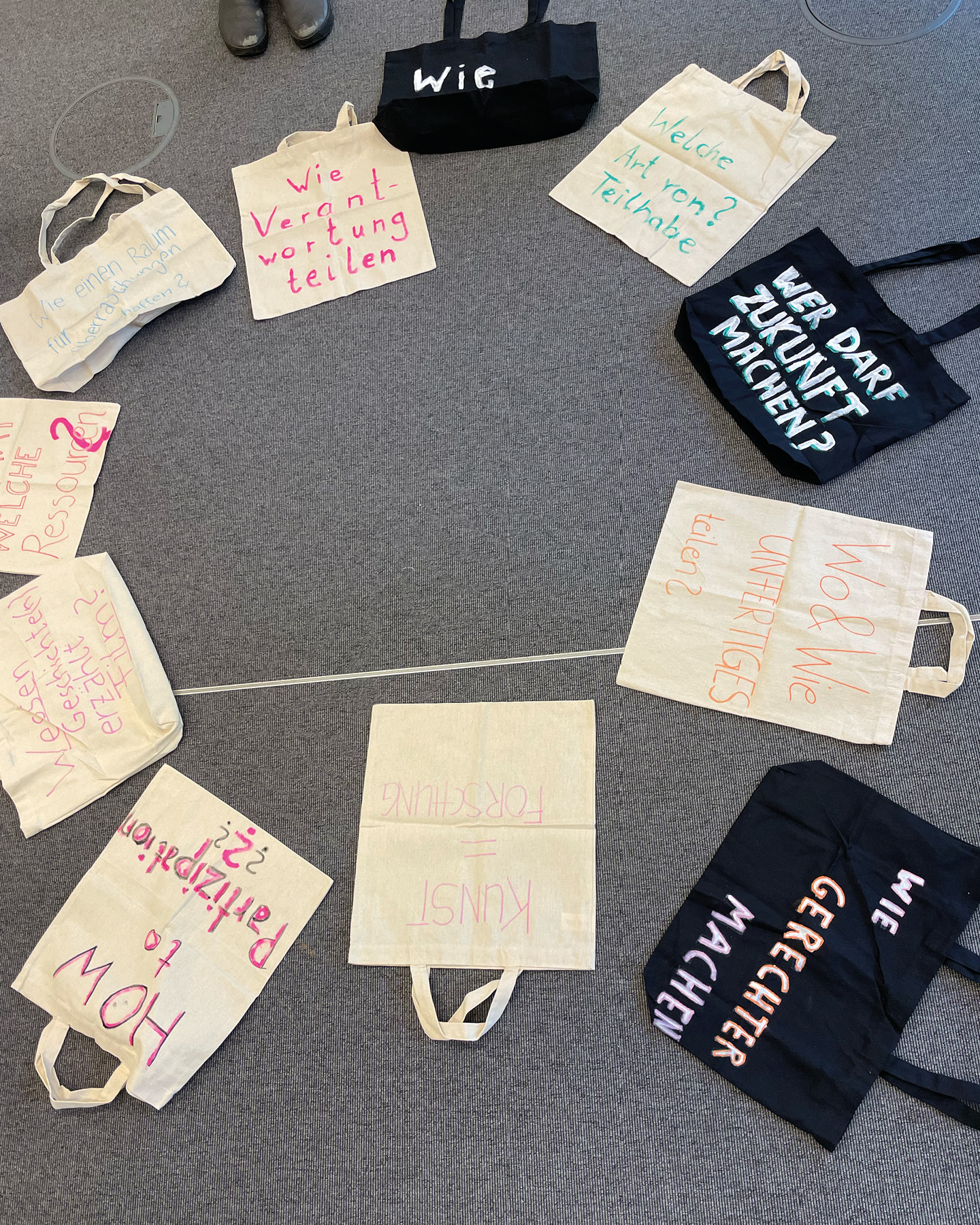
Public Lecture, SINTA | ICS
«Ethics, Politics, and Epistemology of Care»
When?
Mon, 1 December 25
19.15–20.45 CEST
via Zoom
Registration
To receive the Zoom link,
please register by email:
Hannah Ambuehl
Johanna Paschen, PhD of the EcoArtLab, is co-organising the public lecture on «Ethics, Politics, and Epistemology of Care», with Prof. Dr. Vrinda Dalmiya.
This lecture traces how feminist care ethics—rooted in the recognition of shared bodily fragility—must be expanded to include what can be called epistemic vulnerability: the openness to being cognitively undone. Care, understood as an in-time embodied practice, unfolds under conditions of uncertainty, producing an ‘emergent normativity’—an ‘ought’ that is shaped through ethical encounter and cannot be prescribed in advance. This challenges conventional belief desire models of action, inviting alternative accounts of the rationality of acts of care. A theory of knowing built on such caring practice, decenters th quest for certainty and embraces not-knowing in various ways. Could such epistemological shifts loop back to re-theorize fundamental care-concepts beyond their Eurocentric articulations? How might an epistemology reimagined in this way, open up new horizons for thinking, making, and being together in more-than-human worlds?
Vrinda Dalmiya is a professor in the Philosophy Department at the University of Hawai`i, Mānoa. She has been a Fellow at the Indian Institute of Advanced Study, Shimla in India. Her research interests are in analytic feminist theory with a focus on care ethics, feminist epistemology, environment and gender, and comparative philosophy. She is the author of several articles in these areas, the author of the monograph, Caring to Know: Comparative Care Ethics, Feminist Epistemology, and the Mahābhārata (2016), and co-editor of Exploring Agency in the Mahābhārata: Ethical and Political Dimensions of Dharma (2018).
«Ethics, Politics, and Epistemology of Care»
When?
Mon, 1 December 25
19.15–20.45 CEST
via Zoom
Registration
To receive the Zoom link,
please register by email:
Hannah Ambuehl
Johanna Paschen, PhD of the EcoArtLab, is co-organising the public lecture on «Ethics, Politics, and Epistemology of Care», with Prof. Dr. Vrinda Dalmiya.
This lecture traces how feminist care ethics—rooted in the recognition of shared bodily fragility—must be expanded to include what can be called epistemic vulnerability: the openness to being cognitively undone. Care, understood as an in-time embodied practice, unfolds under conditions of uncertainty, producing an ‘emergent normativity’—an ‘ought’ that is shaped through ethical encounter and cannot be prescribed in advance. This challenges conventional belief desire models of action, inviting alternative accounts of the rationality of acts of care. A theory of knowing built on such caring practice, decenters th quest for certainty and embraces not-knowing in various ways. Could such epistemological shifts loop back to re-theorize fundamental care-concepts beyond their Eurocentric articulations? How might an epistemology reimagined in this way, open up new horizons for thinking, making, and being together in more-than-human worlds?
Vrinda Dalmiya is a professor in the Philosophy Department at the University of Hawai`i, Mānoa. She has been a Fellow at the Indian Institute of Advanced Study, Shimla in India. Her research interests are in analytic feminist theory with a focus on care ethics, feminist epistemology, environment and gender, and comparative philosophy. She is the author of several articles in these areas, the author of the monograph, Caring to Know: Comparative Care Ethics, Feminist Epistemology, and the Mahābhārata (2016), and co-editor of Exploring Agency in the Mahābhārata: Ethical and Political Dimensions of Dharma (2018).
